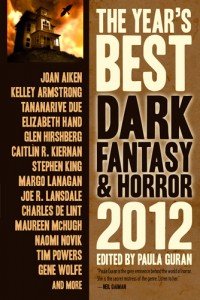“A Tangle of Green Men” by Charles de Lint will be appearing in Prime’s forthcoming Year’s Best Dark Fantasy & Horror: 2012 edited by Paula Guran. Pre-order here!
In “A Tangle of Green Men,” you return to Bordertown. Having been involved in numerous Bordertown projects, you’re no stranger to this place. What is it that you find so inspirational about this setting?
One of my favourite things to do when I write is to bring a sense of wonder to a normal everyday setting. Bordertown’s like that, except on steroids. Yes, there are magical elements, but there are also very down-to-earth elements and often what shines through isn’t the magic, but the lanterns that the characters light against the dark.
When writing in a shared world like Bordertown, how do you keep your stories your own? The setting is already laid out, so how do you make it your own without sacrificing consistency with others’ visions?
You’ve probably heard the old saying that if you give ten writers the same plot you’ll get ten very different stories–if the writers are any good, of course. The same applies to a shared setting such as this. We might use characters and places from each other’s stories but when we do, they’re filtered through our own voices so they can’t help but be individual. I think the magic of the Bordertown books is how the characters we create can travel through the various stories and still remain themselves (or maybe that’s the magic of a good editor’s touch).
But the point is, I’ve never worried about my stories not being my own in Bordertown. Maybe that’s because I was there in the beginning when a handful of us got to flesh out Terri Windling’s original vision so I feel a bit of proprietorship. But mostly I think it’s because the books are a bit like a musical jam and our individual stories only get better when they bang up against what the others are writing. The characters become more real when one can see their footprints beyond the confines of what we’ve asked them to do in our own stories.
Not too long ago, we discussed your story “The Invisibles,” after it was published in Fantasy Magazine. Like “The Invisibles,” “A Tangle of Green Men” deals with real-world issues–in this case, love, loss, and dealing with grief–in a fantastic setting. Once again, I’ll ask: “Why use fantasy to bring attention to reality?”
I don’t really think I’m doing that in this story–unless you consider the faery community to be fantasy. I wrote “A Tangle of Green Men” after attending my first FaerieCon and was quite taken with the warmth and general sense of goodwill that pervades these gatherings.
In fairy tale terms, Joey Green has to face the challenge of the dark woods twice. The first time is before the story opens but we get to see how the decisions he makes shapes him as a different person from the person he once was–a person he didn’t much like. I liked the idea that he’d grow more into the person he wants to be through his association with the faery community. That the magic of people who “dress up” actually gives him the clarity he needs to move forward.
The second entrance into the dark woods is harder for him because he can’t see the possibility of hope on the other side. But maybe that’s the whole point of these journeys. We embark upon them because it seems we have no other choice, but in fact we do have choices every step of the way and it’s what we do with those choices that either lead us out of the woods again, or leave us prey to the wolves.
Having already written a number of stories set in Bordertown, I found it more interesting as a writer to explore the journey of how someone might end up there which is why the setup in “A Tangle of Green Men” is so much longer than the time Joey actually spends in Bordertown.
If you substitute the words “fairy tale” or “myth” for “fantasy,” the reason I use these elements in my own work is that they create resonances that illuminate solutions to the real world struggle without the need for an authorial voice to point them out. Magic never solves the problems–we have to do that on our own–but in fiction it allows the dialogue to have a much more organic approach than the talking heads one can encounter in fiction that doesn’t utilize the same tools.
